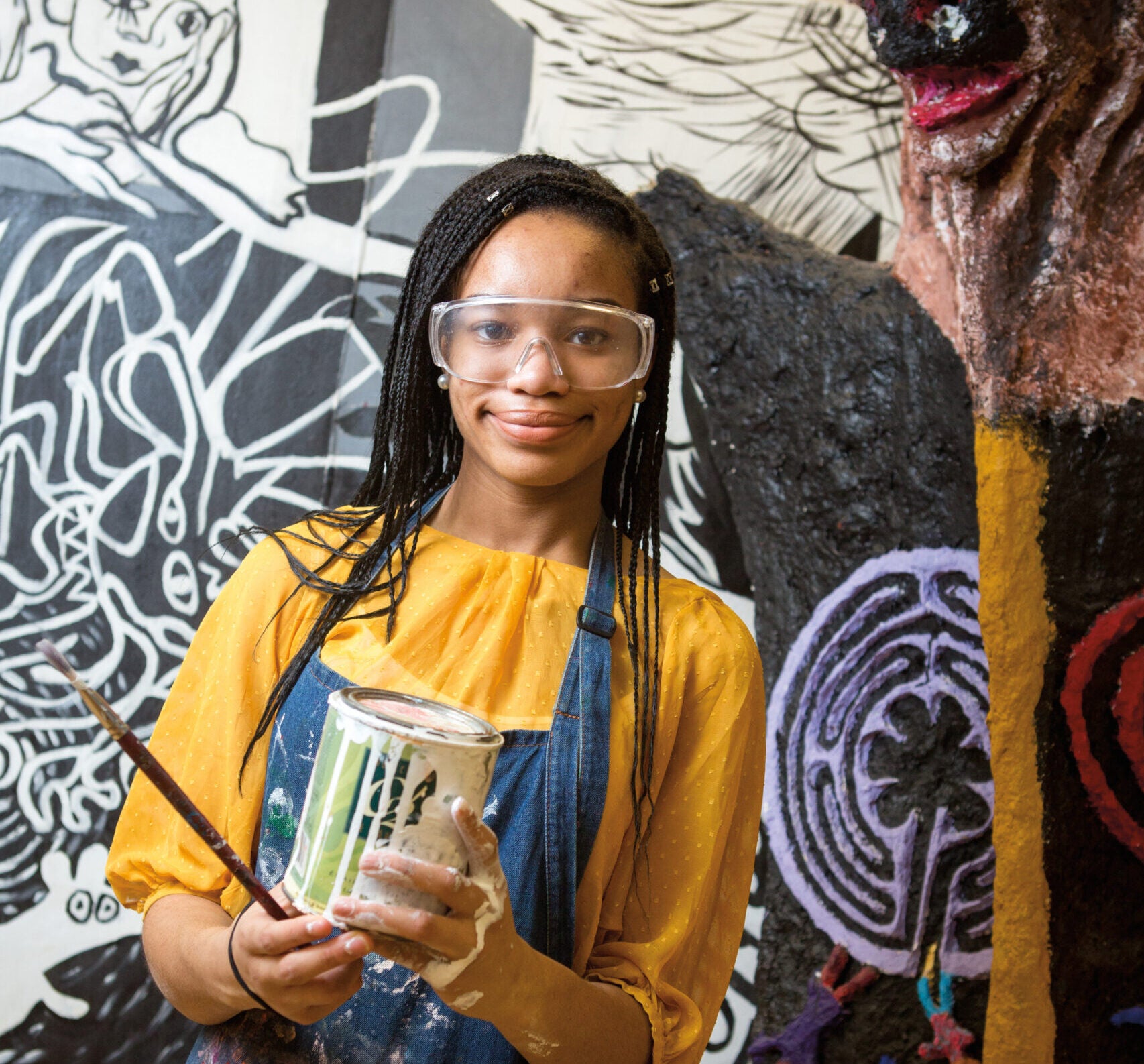Research Centers and Projects
At UCLA Ed&IS, groundbreaking research is more than a concept—it’s a plan of action. Our nationally renowned research centers and projects are doing fundamental work on what matters most in education and information studies in the 21st century: the discovery and application of usable knowledge at the crossroads of policy and practice.
Department of Education Research Centers and Projects
The CalKIDS Institute at UCLA amplifies, strengthens, and evaluates the new statewide children’s savings account program, the California Kids Investment & Development Savings Program (CalKIDS). The Institute is committed to economic equity, higher education access, and the financial well-being of families.
Learn MoreThe Center for Critical Race Studies in Education (CCRSE) at UCLA along with the staff, visiting scholars, and invited authors are dedicated to producing and publishing research with the goal of exploring questions related to theoretical frameworks, methodology, methods, conceptual tools, and practice associated with Critical Race Studies. The inaugural research briefs series was released in June 2016 with five issues. They explored cultural intuition, racial battle fatigue, racial microaggressions, critical race history methodology, and community cultural wealth.
Learn MoreCenter for International & Development Education (CIDE) works to enhance educational capacity, facilitate human and economic development, and promote cross-cultural exchanges related to international and development education.
Center for Research on Evaluation, Standards, & Student Testing sets the national research agenda by creating new methodologies for evaluating educational quality, student learning, and use of assessment data.
Learn MoreThe Center for Transformation of Schools is dedicated to partnering with the education ecosystem to bring about systems change through Humanizing Research, Validating Practices, and Transforming Policies with key stakeholders to support equitable educational outcomes for historically underserved students. Our vision is to be a catalyst for learning communities to boldly nurture and protect the dignity, wellbeing, and full potential of all students.
Learn MoreCenter X is dedicated to dramatically changing education for the underserved students of Los Angeles by designing and conducting programs that produce K-12 teachers committed to social justice, instructional excellence, and caring in low-income urban schools. It is home to the UCLA Teacher Education Program (TEP), Principal Leadership Institute (PLI), and numerous professional development and teaching certificate programs. It also houses several state-level projects.
Learn MoreCUESI Lab examines children’s experiences of social inequality and its influence on their academic and social outcomes. Their research examines the extent to which contextual factors such as poverty, immigration, and social policies, influence family dynamics and, in turn, children’s developmental outcomes.
Learn MoreCivil Rights Project at UCLA is creating a new generation of research in social science and law on the critical issues of civil rights and equal opportunity for all racial and ethnic groups in the United States.
Learn MoreCONNECT links nationally recognized researchers with teachers and administrators at UCLA Lab School and public schools in Southern California to investigate central issues in education.
Learn MoreHERI is a nationally recognized interdisciplinary research center for assessment, evaluation, information, and policy studies. HERI hosts the Cooperative Institutional Research Program (CIRP), a national longitudinal study of the American higher education system that is regarded as the most comprehensive source of information on college students.
HERI is co-led in a partnership with ACE and UCLA Ed&IS.
Learn MoreThe Institute for Democracy, Education and Access seeks to challenge pervasive inequalities in education by conducting research, analyzing policy, and working alongside communities to increase access to high-quality public schools and college.
Learn MoreAt Momentum, they employ mixed-methods approaches to conduct cutting-edge research on efforts to diversify computing and technology fields. They are particularly interested in efforts to recruit women and people of color into computing education pathways and retain them into technology fields. They are social scientists with a pragmatic lens to their work.
Learn MoreThe UCLA Pritzker Center for Strengthening Children and Families unites a multidisciplinary network across campus and throughout LA County to identify prevention strategies that safely reduce the need for foster care, while supporting equitable reform to our child welfare system.
Learn MoreThe Choices Project, a research initiative established by UCLA Allan Murray Cartter Professor of Higher Education Walter R. Allen, aims to improve the academic options, experiences, and outcomes of African American and Latino students in the California system of higher education.
Learn MoreThe Paulo Freire Institute seeks to gather scholars and critics of Freire’s work in permanent dialogue to foster the advancement of new theories and concrete interventions in the real world.
Learn MoreThe Sudikoff Family Institute for Education enhances awareness of critical education issues by utilizing the press and other media to convey the work of Ed&IS faculty to policy makers, educators, and the general public.
Learn MoreAt the UCLA Capacity Building Center, we are not just developing capacity; we are nurturing a global community of change-makers and innovators. The Center plays a unique role in cultivating impactful global partnerships. We synergize the expertise of academics, practitioners, and policymakers in a shared mission of co-learning and equal partnerships. Our aim is to strengthen both human and institutional capacities through reflective inquiry and strategic collaboration. Committed to advancing stakeholder participation and realizing the concept of local ownership as a tangible outcome, we focus on impactful changes that meaningfully improve lives. Our ultimate goal is to spark a wave of empowerment, connecting and strengthening communities around the common goal of prioritizing local solutions to local challenges.
Learn MoreThe UCLA Center for Community Schooling is a campus-wide initiative to advance university-assisted community schools. As stable anchor institutions, universities play a unique role as K-12 community school partners. Our research, teaching, and service missions inform and are informed by the work of local schools and communities. In partnership, we are poised to disrupt historical inequalities and reimagine schooling as a public good that prepares all students to succeed in college, careers, and civic life.
Learn MoreThe Center’s aim is to provide local, state, national and global leadership in this field, leveraging groundbreaking advances in cognitive and neurosciences, linguistics, and education to inform and transform K-12 teaching and learning.
Learn MoreThe UC/CSU Collaborative for Neuroscience, Diversity, and Learning believes that improving literacy is one of the great civil rights issues of this generation. Californians must work together to secure equal access to quality literacy instruction for all our children. Doing so is key not only to our children’s literacy and well-being, but also to our communities, democracy, and economy. The UC/CSU California Collaborative was established in June 2019 by Assembly Bill AB 1703. By leveraging the wealth of expertise across the UC/CSU system and beyond, we focus on sharing and cultivating evidence-based and inclusive teaching practices to reshape how students of all ages in California are taught.
Learn MoreFounded by Information Studies Professor Ramesh Srinivasan, UC-wide Digital Cultures Lab offers a unique, people-focused analysis of new technologies working across every continent and dozens of countries across the world. This lab examines the means by which new media technologies impact businesses, economics, cultures, politics, labor, and the environment through collaborations with global partners. Srinivasan explores the future of algorithms, AI, automation, and cryptocurrencies with these themes in mind.
Department of Information Studies Research Centers and Projects
Founded in Los Angeles in 2005, the California Rare Book School (CalRBS) is a non-degree education program dedicated to providing the knowledge and skills required by collectors and professionals working in all aspects of the library, special collection, archives, museums, and rare book community, as well as for students interested in entering the fields of justice studies, library ethics, critical librarianship, and rare book conservation and preservation. We offer workshops, lectures, classes, and certificate programs aimed at professionals and members of the public who care about the artifacts of the past, the documents of the present, and their potential to change the course of our future.
Learn MoreThe Center for Critical Internet Inquiry’s work explores interdisciplinary intersections of digital technologies and society, with the goal of creating fairness, justice, equity, and sustainability in relationship to our technological engagements.
Learn MoreCenter for Information as Evidence is an interdisciplinary forum addressing the ways in which information objects and systems are created, used, and preserved as evidence.
Learn MoreCenter for Knowledge Infrastructures is an interdisciplinary forum addressing the ways in which information objects and systems are created, used, and preserved as evidence.
Learn MoreThe Community Archives Lab at UCLA explores the ways that independent, identity-based memory organizations document, shape, and provide access to the histories of minoritized communities with a particular emphasis on understanding their affective, political, and artistic impact.
Learn MoreThe Library, Ethics, & Justice Lab, based in the Department of Information and Library Science (ILS), focuses on the importance of representation practices to the production and articulation of knowledge in multiple disciplines and domains (libraries, but also museum, scientific communities, etc.). At the core of Jutice-Lab activities is a critical approach and a deep attention to the cultural, political, ethical, and power structures at the root of all information, institutional, and representation practices as they are embedded in local and global systems. Justice-Lab is especially attuned to library environments as socially-embedded institutions. By comparing different theoretical and methodological approaches, Justice-Lab is articulating a broader (basic and foundational) cross-disciplinary framework in which to study libraries and information.
Learn MoreSocial Media and the Spread of Hate or SMASH is an interdisciplinary collaboration between researchers, educators, and policy advocates from UCLA’s School of Education and Information Studies, the Semel Healthy Campus Initiative (HCI), and an independent non-profit partner, the Organization for Social Media Safety (OFSMS). SMASH is funded by UCLA’s Initiative to Study Hate.
Founded by Information Studies Professor Ramesh Srinivasan, UC-wide Digital Cultures Lab offers a unique, people-focused analysis of new technologies working across every continent and dozens of countries across the world. This lab examines the means by which new media technologies impact businesses, economics, cultures, politics, labor, and the environment through collaborations with global partners. Srinivasan explores the future of algorithms, AI, automation, and cryptocurrencies with these themes in mind.
Publications
Our journals integrate research and practice. They serve as a reference, resource, and action plan for a wide array of audiences, including educators, policy makers, researchers, and the general public.
Interactions

Founded in 2004 by doctoral students from UCLA Ed&IS, InterActions is a peer-reviewed, open access journal committed to the promotion of interdisciplinary and inclusive scholarship. The journal brings together senior and emerging scholars, activists, educators, and professionals whose work covers a broad range of theory and practice.
XChange

The Center XChange is an online repository of publications and resources released in themed issues. In these issues, you will find articles, evaluation reports, research papers, lesson plans, professional development tools, dissertations, book reviews, and our own reflections on the work of transforming public schools.
UCLA ED&IS Magazine Homepage

The UCLA School of Education and Information Studies’ magazine highlights the public scholarship of our faculty, alumni and students.
